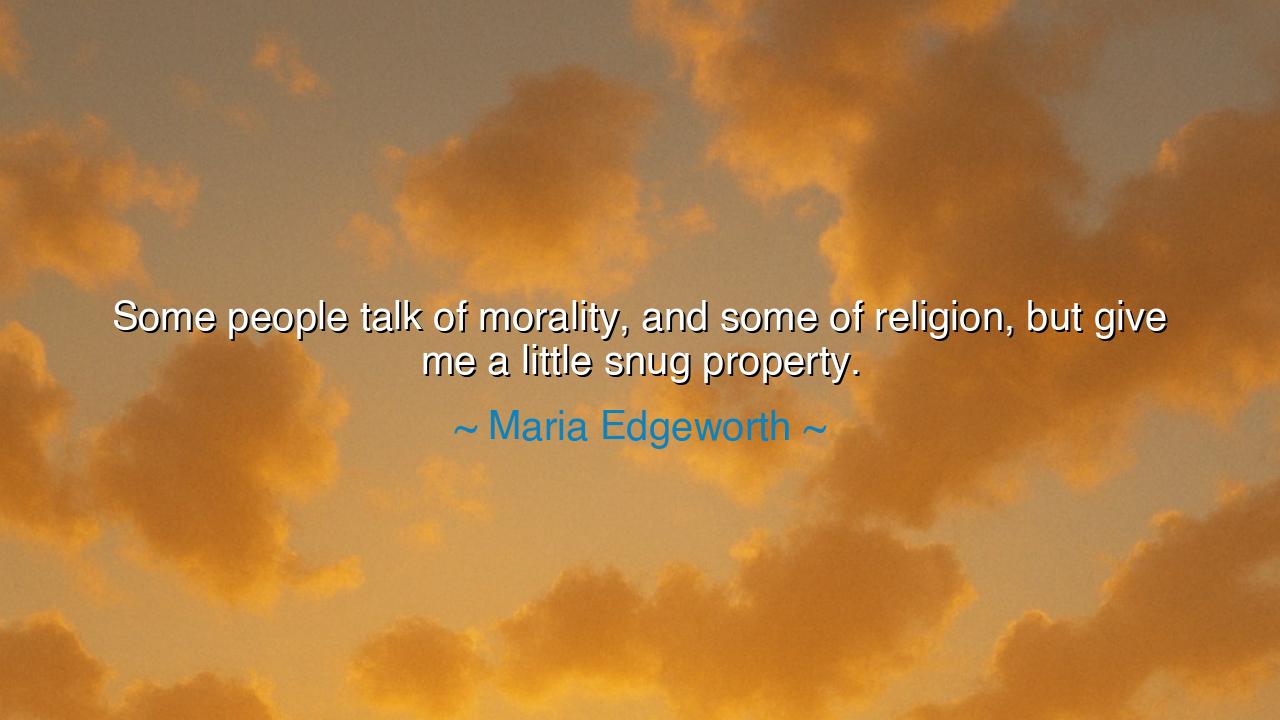
Some people talk of morality, and some of religion, but give me a
Some people talk of morality, and some of religion, but give me a little snug property.






Maria Edgeworth, with the sharp wit of a novelist and the insight of a philosopher, once declared: “Some people talk of morality, and some of religion, but give me a little snug property.” In this piercing observation, she reveals a truth both humorous and profound: lofty talk of morality and religion may stir the air, but for many souls, the true longing is security—something tangible, a snug property, a place of one’s own. Her words shine a light on the tension between ideals and material needs, between the soaring voice of principle and the grounded desire for stability.
The ancients too understood this. In the dialogues of Plato, men debated the essence of justice and the nature of the good. Yet outside the Academy, the farmer prayed not for abstract truth, but for rain upon his fields and peace upon his home. Even Aristotle, who exalted virtue as the highest good, acknowledged that a man requires property and livelihood to practice virtue at all. Edgeworth’s quote strikes at this same paradox: what good is fine talk of ethics or theology to one who has no bread, no roof, no soil of his own to till?
History gives us examples that illuminate her wisdom. Consider the peasants of France before the Revolution. The nobles and clergy spoke often of morality and religion, but the common people longed simply for land to cultivate and food to eat. Their hunger for property—for the ability to sustain themselves—drove them to tear down the old order. For them, ownership was not greed but survival. Edgeworth’s words reflect this eternal truth: material security is the ground upon which higher ideals can rest.
Yet her words also carry a note of irony, even satire. She does not despise morality or religion, but she exposes the hypocrisy of those who preach them while ignoring the needs of the body. What use are sermons on virtue if the hearer is starving? What value are religious promises if the believer cannot secure a modest home? By exalting the snug property, Edgeworth calls us to remember that philosophy and faith must be joined with justice, that no society is righteous if its people lack security.
This does not mean that she places property above all. Rather, she reminds us that the human heart yearns not only for heaven but also for earth. To be human is to need both bread and meaning, both soil and spirit. The one without the other leaves us incomplete. Her wit is thus both practical and profound: let us not hide behind grand words while forgetting the small, necessary blessings that make life livable.
The meaning of her quote, then, is this: ideals are noble, but without material stability they remain distant echoes. Property, modest and secure, is not mere possession—it is dignity, independence, and peace. It is the foundation upon which morality may flourish and religion may be practiced freely. Without it, people are vulnerable to exploitation, dependent upon the charity or domination of others.
The lesson is clear: if you would build a just life, or a just society, do not speak only of high ideals. Ensure that every person has the means to live with dignity. Snug property—whether a home, livelihood, or place of security—is not the enemy of virtue but its companion. A nation is not strong when it speaks of morality and religion while its people hunger; it is strong when it grants its people the stability that allows them to seek the higher things.
Practical actions follow. Work not only for lofty principles, but also for tangible justice. Provide for your household, and extend your concern to ensure others too may live in security. When you hear men speak of virtue, remember to ask: do they also care for the poor, the homeless, the dispossessed? For morality, religion, and property must walk together if humanity is to flourish.
O seeker, carry Edgeworth’s wisdom: ideals without security are empty, but security without ideals is barren. Strive for both. Cherish morality, respect religion, but do not despise the simple gift of a snug home, a safe place, a piece of earth to call your own. For in that union of soil and spirit lies the fullness of life.






AAdministratorAdministrator
Welcome, honored guests. Please leave a comment, we will respond soon